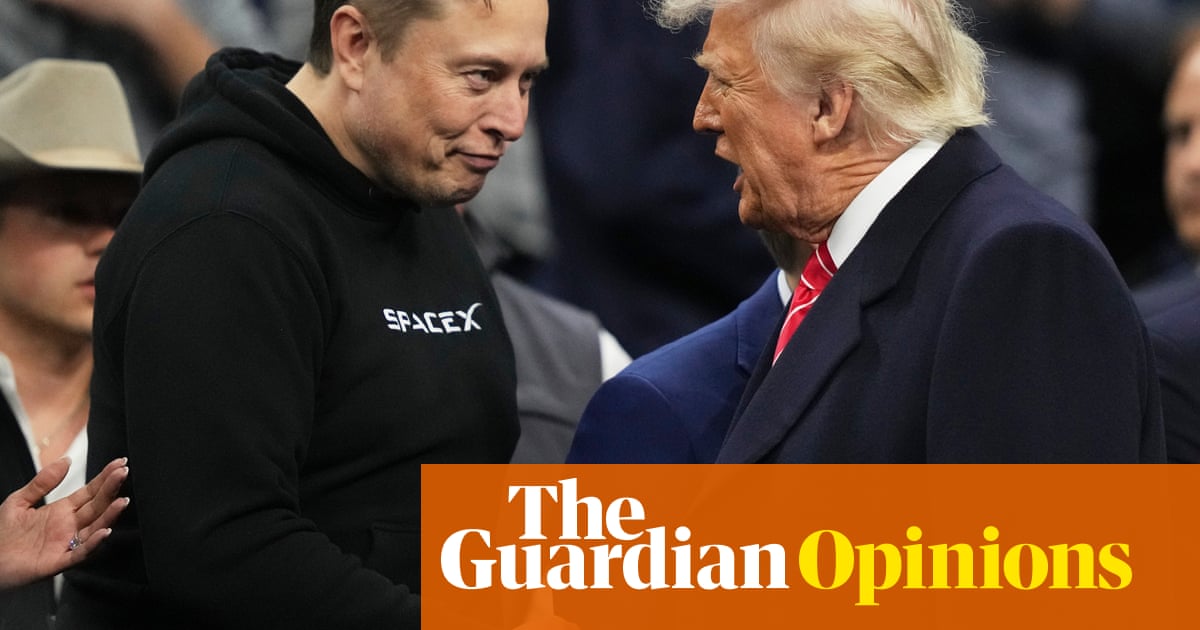Nothing is going according to plan for the Trump administration. Thebig, beautiful bill, originally vaunted to save the US taxpayerat least $2tn, so far, according to projections, delivers savingsin the region of $9.4bn. Elon Musk has exited government, saying he wasn’t in favour of the bill, which could be big, or beautiful, but in this case, not both. Musk’s government contract ran for only 120 days, so it would have been up at the end of this week anyway.
Just to try to lasso those words back to an observable reality where they might mean something, the bill isn’t all that big; there are some very vindictive moves around Medicaid entitlement, intended to fund tax cuts elsewhere, that will have seismically bad outcomes for vulnerableindividuals without necessarily burning a hole in anyone else’s pocket. Tips and overtime are exempted from tax, but probably the only thing that’s legitimately big, or if you like, huge, is the increase of the debt ceiling by $4tn. So it gives with one hand, takes away with the other, promise-wise – those tax exemptions were mentioned often on the campaign trail, but a government that causes havoc trying to shrink the state while simultaneously increasing the amount it can borrow isn’t going to please anyone in either party but sycophants.
As for “beautiful” – thesupplemental nutrition assistance program(Snap) will see reforms that throw more costs on to each state. Forty-two million low-income Americans are on Snap, and there would be more requirements upon those who are childless. Centring cuts on those who are already hungry has a cruelty that glisters in an age of necropolitics, but it lacks the scale, the granite finality, that “beauty” would connote to these people.
“We have to get a lot of votes, we can’t be cutting – we need to get a lot of support,” Trump said, in response to Musk’s criticism, which seems to have enlivened in the president some fresh appreciation of how democracy works, though whether it will last until lunchtime is anyone’s guess. The worry about Musk’s departure is not that Doge will be lost without him, but that his criticism will embolden the hawks in Congress, who didn’t want to vote for the bill in the first place. Then it really will be a puddle of words without meaning.
Meanwhile, aUS federal court struck downalmost all Trump’s “liberation day” tariffs, in the classic judicial way, by deeming them an overreach of his powers. The ruling is purely on legislative grounds (Trump didn’t wait for the approval of Congress) rather than on any economic grounds (that they would make everything much more expensive for the US public, obliterating the impact of any big or beautiful tax cuts with a single big-ticket purchase, particularly if any part thereof was made in China, which means almost everything). The justice department has filed an appeal.
The observer could file all this under “government: harder than it looks”. Moving fast and breaking things doesn’t work. Borrowing and spending while slashing and burning in a formless, ad hoc fashion doesn’t work. Billionaires with fragile egos, trying to cooperate while reserving the right to say whatever they like about each other, well, this has never worked.
It would be the gravest imaginable mistake, though, to think that just because the wheels are coming off it this bus is losing its destructive power. One of the global indignities of the US spectacle is having to lose hours analysing the hidden meanings and augurs of the acts of men who don’t, themselves, give one second’s thought to anything. Did Trump mean to humiliate Volodymyr Zelenskyy, and if he didn’t, what came over him, and if he did, what could we predict of the future of Europe?Did Musk mean to Sieg Heil, and if he didn’t, has he lost his mind, and if he did, has he lost his mind? Did they mean to fall out, will they get back together, is this a pantomime, will one chase the other further from reality or back towards it?
These questions fundamentally debase us, at the same time as giving the false sense of security that, once these guys step away from public life, singly or together, sense will be restored. The dangerous thing about them is the thing that makes them infinitely replaceable: there will always be another richest guy in the world; there will always be another high net-worth individual who has become separated from social values, not by the wealth itself but by the single-minded solipsism of its accretion. Trump and Musk could get to a place of such enmity that they eschewed the offices of state to spend the days mud-wrestling, and there would be no comfort to take from it, just a new double-act, with new peccadilloes that would be strikingly like the last.
The federal court’s decision is another matter, and can be mutedly celebrated until it fails to act on some other gross constitutional transgression.
Zoe Williams is a Guardian columnist
